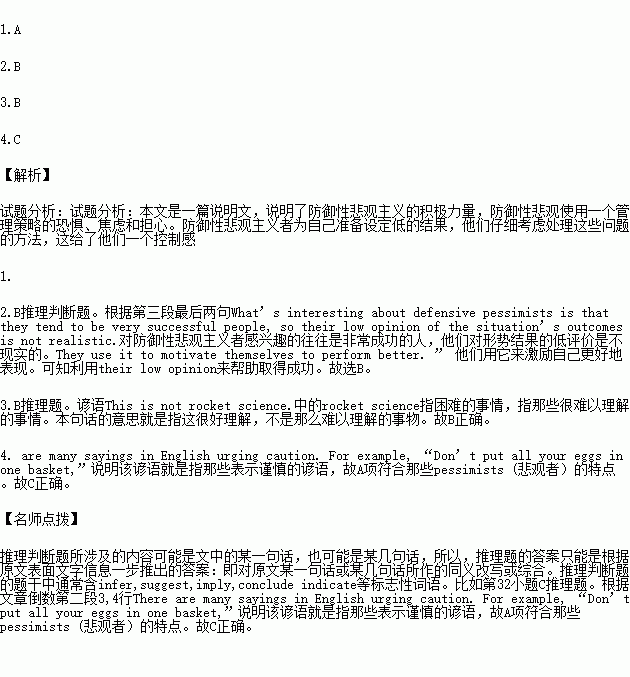题目内容
Are you an optimist? Do you look at your glass and see it as half full? Do you believe that every cloud has a silver lining and that generally things turn out for the best? Do you believe that if something is meant to be, it will be? If you reply “yes” to all of these questions, then you are an optimist. You probably are enthusiastic, cheerful and outgoing. You may well be successful at work and in love.
But you may be misguided because things don’t turn out for the best. You may believe that when one door closes another one opens (for example, you may fail to obtain a new job, and another chance will come around soon). Wrong. When one door closes, another door slams in your face. That’s bitter reality.
Now a book has been published which confirms what we pessimists (悲观者) have suspected all along. It’s called The Positive Power of Defensive Pessimism. Its author argues that defensive pessimism can lead to positive results. Defensive pessimism is a strategy used to manage fear, anxiety and worry. Defensive pessimists prepare for things by setting low outcomes for themselves. They carefully consider everything that may go wrong and plan for ways to handle these problems. And this gives them a sense of control. Lawrence Sanno, a psychology professor, says, “What’s interesting about defensive pessimists is that they tend to be very successful people, so their low opinion of the situation’s outcomes is not realistic. They use it to motivate themselves to perform better. ”
So far, so good. This is not rocket science. Defensive pessimists prepare carefully and consider what might go wrong, whether at work, on a date or even in a sports game. It makes sense to have a back-up plan. There are many sayings in English urging caution. For example, “Don’t put all your eggs in one basket,” and “Don’t count your chickens until they hatch.” To have a confident and optimistic approach to life’s problems is good. But listen to what Woody Allen, the American comedian says, “Confidence is what you have before you understand the problem.”
There are pros and cons of being an optimist and a pessimist. Don’t feel bad if you see the glass half empty. You are a realist. But lighten up and hook up with someone who sees the same glass half full.
1. The writer would probably describe himself as ________.
A. a realist B. a scientist
C. an optimist D. an artist
2.Defensive pessimists are likely to make use of ________ to help achieve success.
A. the final outcome B. their low opinion
C. people’s motivation D. their performance
3.The underlined sentence “This is not rocket science” in Paragraph 4 means “________”.
A. it is out of the question
B. it is quite simple to understand
C. it is far beyond reach
D. it is not a worthwhile thing to do
4. Which of the following English expressions would a defensive pessimist probably believe?
A. “Every cloud has a silver lining.”
B. “Whatever will be, will be.”
C. “Don’t put all your eggs in one basket.”
D. “The glass is half full not half empty.”
 孟建平小学滚动测试系列答案
孟建平小学滚动测试系列答案在学习、生活和工作中,学会与人合作是非常重要的。请根据下表中提供的信息,写一篇主题为 “Being a good partner”的英文发言稿。
为何合作 | 有利于互相学习,增进友谊,节省时间与精力。 | |
与谁合作 | 与喜欢的人合作 | 心情愉快,同甘共苦。 |
与不喜欢的人合作 | 学会容忍,发现优点。 | |
怎样合作 | 你的观点……(至少2条) | |
注意:1. 对所给要点进行陈述,适当发挥,不要逐字翻译。
2. 词数110左右。开头和结尾已经给出,不计入总词数。
参考词汇:合作cooperation n. cooperate v.
Good afternoon, everyone!
The topic of my speech today is “Being a good partner.”
Wish my views would be helpful. Thank you for your listening!

